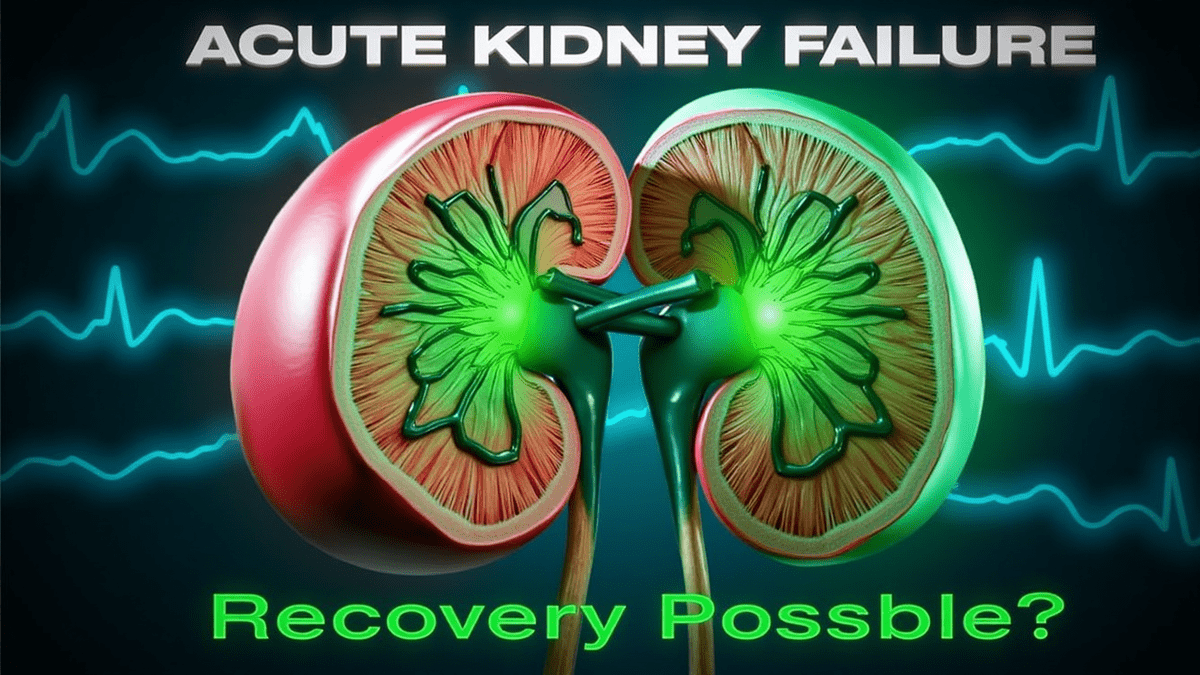Medically Reviewed and Compiled by Dr. Adam N. Khan, MD.
Understanding the Road Back from Acute Kidney Failure
Hearing that your kidneys have suddenly stopped working is a heavy moment. It’s scary, overwhelming, and leaves you with a million questions. But here is the good news: unlike chronic kidney disease, which is a slow decline over years, acut
Medically Reviewed and Compiled by Dr. Adam N. Khan, MD.
Understanding the Road Back from Acute Kidney Failure
Hearing that your kidneys have suddenly stopped working is a heavy moment. It’s scary, overwhelming, and leaves you with a million questions. But here is the good news: unlike chronic kidney disease, which is a slow decline over years, acute kidney failure (AKF)—also called acute kidney injury (AKI)—is often reversible.
Your kidneys are incredibly resilient organs. Their main job is to filter your blood, balance your fluids, and keep your blood pressure in check. When they “shut down” due to an infection, dehydration, or medication reaction, they aren’t necessarily gone for good. They are often just “stunned.”
Recovering from acute kidney failure is a marathon, not a sprint. It requires a mix of medical oversight, strict nutritional changes, and a lot of patience. This guide will walk you through exactly what to expect as you navigate the healing process.
The Healing Process: What Happens First?
The first stage of recovery usually happens in the hospital. Doctors focus on fixing the “trigger.” If a severe infection caused the failure, you’ll get antibiotics. If it was dehydration, you’ll get IV fluids.
As your kidneys begin to wake up, you might notice a few things:
- Increased Urine Output: This is often the first sign of progress.
- Reduced Swelling: As the kidneys filter again, the puffiness in your ankles and face starts to fade.
- Mental Clarity: When toxins like urea leave your system, that “brain fog” usually lifts.
However, just because you’ve been discharged from the hospital doesn’t mean your kidneys are back to 100%. It can take weeks or even months for your lab numbers (like creatinine and GFR) to return to your normal baseline.
Essential Diet Changes for Recovery
What you put in your body is the most important factor you can control. During recovery, your kidneys are like a bruised muscle—you don’t want to overwork them.
1. Managing Protein Intake
While protein is vital for healing tissues, processing it creates a waste product called urea. If you eat too much protein, your struggling kidneys have to work overtime. Focus on high-quality proteins like egg whites or small portions of lean chicken, but always follow the specific daily limit set by your doctor.
2. The Potassium and Phosphorus Balance
When kidneys are recovering, they may struggle to balance minerals.
- Potassium: Too much can affect your heart rhythm. You might need to skip bananas, oranges, and potatoes for a while.
- Phosphorus: High levels can pull calcium out of your bones. Limit dairy and processed foods that have “phos” additives.
3. Monitoring Sodium and Fluids
Salt makes your body hold onto water, which raises blood pressure and stresses the kidneys. Stick to fresh herbs for flavor. Regarding water: your doctor will tell you if you need to “flush” your system with plenty of water or if you need to restrict fluids to prevent swelling. Always ask for a specific fluid goal.
Medications: The Do’s and Don’ts
One of the biggest risks during recovery is “re-injuring” the kidneys with common medications. This is where many people accidentally set their progress back.
- Avoid NSAIDs: Common pain relievers like ibuprofen (Advil, Motrin) and naproxen (Aleve) are toxic to kidneys that are trying to heal. Use acetaminophen (Tylenol) instead, but only after checking with your care team.
- Review Your Scripts: Some blood pressure meds (like ACE inhibitors) are great for long-term health but might need to be paused during the acute recovery phase.
- Herbal Supplements: Be very careful. Many “detox” teas or herbal pills contain minerals or compounds that can strain the kidneys.
Monitoring Your Progress at Home
Recovery doesn’t just happen at the doctor’s office. You are the primary observer of your own health. Keeping a simple daily log can help you spot issues before they become emergencies.
| What to Track | Why it Matters |
| Daily Weight | Sudden weight gain (2-3 lbs in a day) usually means fluid retention. |
| Urine Color/Amount | Darker urine or a decrease in trips to the bathroom can signal a setback. |
| Blood Pressure | High blood pressure is both a cause and a symptom of kidney issues. |
| Energy Levels | Extreme fatigue might mean your red blood cell count is low (anemia). |
The Importance of Follow-Up Care
It is very common to feel “fine” while your blood work still looks “bad.” This is why you cannot skip your nephrology appointments.
Your doctor will likely order regular Basic Metabolic Panels (BMP). They are looking at:
- Creatinine: A waste product from muscle breakdown. Lower is usually better.
- GFR (Glomerular Filtration Rate): This is a score of how well your kidneys are filtering. Think of it like a percentage of “kidney power.”
- Electrolytes: Keeping sodium, potassium, and calcium in the “green zone.”
Lifestyle Adjustments for Long-Term Health
Once you have recovered from an acute episode, you are at a higher risk for kidney issues in the future. Protecting them becomes a lifelong habit.
- Quit Smoking: Smoking damages small blood vessels, including the tiny filters in your kidneys.
- Control Blood Sugar: If you have diabetes, keeping your A1c in check is the best gift you can give your kidneys.
- Exercise Gently: Don’t jump back into intense weightlifting or marathons immediately. Start with walking to improve circulation without causing muscle breakdown that stresses the kidneys.
When to Call Your Doctor Immediately
Recovery isn’t always a straight line. Sometimes there are bumps in the road. Seek medical help if you experience:
- A metallic taste in your mouth.
- Shortness of breath (this can mean fluid is building up in your lungs).
- Persistent nausea or vomiting.
- Confusion or extreme drowsiness.
- Visible blood in your urine.
Moving Forward with Confidence
Recovering from acute kidney failure is a significant life event. It’s normal to feel anxious about every glass of water you drink or every ache you feel. However, by sticking to a kidney-friendly diet, avoiding harmful medications, and keeping your follow-up appointments, you give your body the best chance to heal.
Your kidneys are tough. With the right support and the right habits, you can return to a full, active life.
Takeaway Points for Your Recovery
- Be Patient: Lab numbers often lag behind how you actually feel.
- Read Labels: Avoid hidden sodium and phosphorus in packaged foods.
- Clear All Meds: Never take a new supplement or over-the-counter pill without asking your renal team.
- Stay Hydrated (Safely): Follow your doctor’s specific “ounces per day” instructions.
- Watch the Scale: Rapid weight changes are about fluid, not fat.
Medlifeguide give information about also kidney diseases, chronic kidney disease (CKD) and also diet plans for kidney health; reach out to acheive these information for your and your family’s health
Medical Disclaimer
All content published on medlifeguide is intended for informational and educational purposes only and does not substitute professional medical advice, diagnosis, or treatment. Always consult a qualified healthcare provider regarding any medical condition, symptoms, or treatment decisions.

